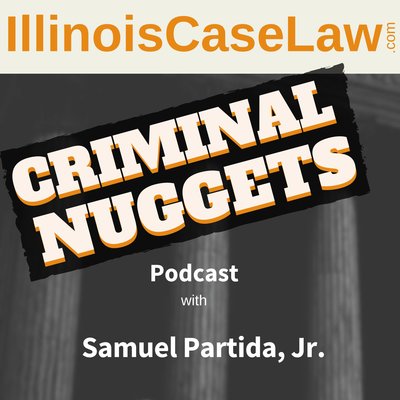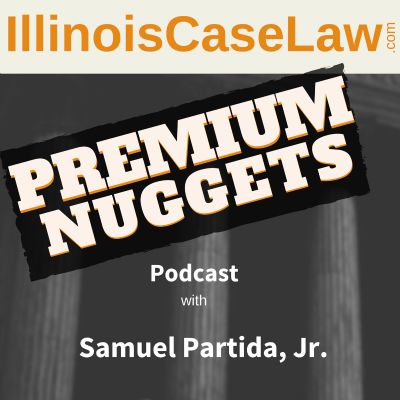Apr 1, 2020
People v. Mooney, 2019 IL App (3d) 150607 (March). Episode 599 (Duration 9:21)
Agreeing to continuance was ineffective, outright reversal is the only remedy.
Charge
Defendant, Bryant K. Mooney Jr., appeals following his conviction for driving while license suspended.
Issue
He argues, inter alia, that defense counsel was ineffective for twice agreeing to the State’s motions for continuances on the day of trial, thus tolling the speedy trial clock.
On appeal, defendant argues that defense counsel rendered ineffective assistance by failing to move for dismissal based on a violation of his statutory speedy trial rights. Alternatively, he argues that counsel was ineffective for twice agreeing to continuances and agreeing that the speedy trial clock should be tolled when it was the State that needed the second continuance and the State’s actions that necessitated the third.
Gist
The State concedes that the first continuance in defendant’s case, issued on October 27, 2014, was wholly attributable to the prosecution. Between the filing of defendant’s speedy trial demand on August 19, 2014, and the second continuance on January 5, 2015, 139 days elapsed that are indisputably attributable to the State.
Each of the second and third continuances resulted in delays of more than 21 days, and thus either continuance would have caused the speedy trial period to elapse unless attributable to defendant.
Speedy Trial Demand
On August 19, 2014, defense counsel filed a speedy trial demand, requiring that defendant be tried no later than January 26, 2015. That same day, pursuant to defense counsel’s request, the court set the matter for a jury trial on October 27, 2014.
First Delay
Six days before the scheduled jury trial, the State filed a motion for continuance.
In the motion, the State claimed that the arresting officer would be unavailable on the scheduled trial date because of a previously scheduled court appearance in a different county. On October 27, 2014, defense counsel announced ready for trial, but the court granted the State’s motion and set the matter for trial on January 5, 2015.
Second Delay
On the morning of January 5, 2015, defense counsel again announced ready for trial, adding that defendant was requesting a bench trial.
The court immediately told counsel, without further explanation: “[Y]ou understand the predicament I am in so if it is going to go, it is not going to go until this afternoon probably.”
The prosecutor explained that its testifying officer in the case had not slept in two days and had to work that night at 6 p.m. The prosecutor opined that such a situation was not desirable but conceded “there is a speedy trial demand by the defendant so we have to fit it within a certain time frame.” The court agreed, stating, “[w]e have to get this done” and noting that only 20 days remained on the speedy trial clock.
The court instructed the parties to return at 12:15 that afternoon in an attempt to begin the trial.
The prosecutor commented: “And if we know it is going to go long, I will make my motion at that time.”
Then a written order bearing that date appears in the common law record. The order, a preprinted form with some items circled and blanks filled in, schedules a trial for March 24, 2015, a date significantly later than the January 26 deadline established by defendant’s speedy trial demand. The order indicates that the continuance is on the motion of defendant. It also indicates that “Defendant agrees that speedy is tolled.”
Third Delay
On March 24, 2015, defense counsel again requested a bench trial but told the court that she had been tendered a video instanter and would be requesting a new trial date.
The court inquired as to why, in a matter originally scheduled for trial the previous October, a video was only now being tendered. The prosecutor responded that he did not know. The following colloquy ensued:
“THE COURT: Is there any way you can watch the video and try the case?[DEFENSE COUNSEL]: Today?
THE COURT: Well, yeah, we do have a short day today. We have to find something to do in the afternoons.[DEFENSE COUNSEL]: If Your Honor prefers, I can try. I would prefer—
THE COURT: You can try? What does the video entail in driving?[THE STATE]: Him driving? I have an expert on that topic coming up.
THE COURT: Because if defense counsel is vehemently moving for the motion to continue this date because you gave her the discovery late, she has grounds to do it. Are you vehemently moving for the motion for continuance?[DEFENSE COUNSEL]: Judge, I am asking for a motion to continue.
THE COURT: All right, I am going to grant your continuance. Sorry, officer. She’s got grounds. New date. When can he be back?”
The parties did not set a date while on the record. However, the written order (again a preprinted form) issued that day shows that the trial was set for April 21, 2015. The written order again indicates that the continuance was on the motion of defendant and that “[d]efendant agrees that speedy is tolled.”
The Trial
The matter proceeded to a bench trial on April 21, 2015, at which the court found defendant guilty of driving while license suspended. The court sentenced defendant to a term of 24 months’ probation.
Speedy Trial By Statute
Section 103-5(b) of the Code holds that a defendant free on bail or recognizance must be brought to trial within 160 days of his speedy trial demand. 725 ILCS 5/103-5(b).
The Code further dictates that “[d]elay occasioned by the defendant shall temporarily suspend for the time of the delay the period within which a person shall be tried.” Id. § 103-5(f). Thus, to show a violation of his speedy trial right, a defendant must show that he did not “cause or contribute to the delays.” People v. Staten, 159 Ill. 2d 419, 426 (1994).
“A defense counsel’s express agreement to a continuance may be considered an affirmative act contributing to a delay which is attributable to the defendant.” People v. Kliner, 185 Ill. 2d 81, 114 (1998).
What Were The Reasons For TheDelay?
Defendant’s argument requires this court to ask the questions:
(1) Why would counsel agree that the speedy trial clock would be tolled and
(2) What impact did these agreements have on defendant’s right to a speedy trial?
State Witness Had A Problem
On January 5, 2015, the date of the second continuance, defense counsel announced ready for trial. Thereafter, the court and prosecutor discussed an apparent scheduling issue with the testifying officer, and the matter was ultimately continued. Delays occasioned by the unavailability of a State’s witness or by the court’s schedule cannot be attributed to a defendant. See Bonds, 401 Ill. App. 3d at 677; Kliner, 185 Ill. 2d at 119.
Late Discovery Causes The Last Continuance
While the third continuance, on March 24, 2015, was explicitly on defense counsel’s motion, that motion was made only after the State tendered a video of the arrest moments before trial. The delay caused by defense counsel’s motion should not be held attributable to a defendant if that motion was necessitated by the State’s late filing of discovery.
At oral argument, the State emphasized that the prosecutor was under no obligation to tender the video at all in this misdemeanor case. We find this to be irrelevant. Whether or not any obligation existed, the fact is that the prosecutor did tender the video, and it would have been inappropriate for defense counsel to proceed to a trial without thoroughly reviewing that piece of evidence.
Analysis
Despite these facts and the relevant law, counsel twice agreed that the speedy trial clock would be tolled.
On the occasion of the second of the three continuances, counsel even allowed an order to be entered indicating that the continuance was on her motion. Having announced she was ready for trial on January 5, 2015, there is no apparent trial strategy motive for agreeing to any delay.
Similarly, on March 24, 2015, there is no apparent strategic benefit to defendant from counsel agreeing to toll the speedy trial clock.
Instead, counsel twice agreed, despite her expressed readiness for trial on both of the scheduled dates, to allow both continuances and concessions of tolling to be attributed to defendant. This, failure was objectively unreasonable under prevailing professional norms, and it rendered counsel’s performance deficient.
Clearly Prejudicial To Defendant
The more difficult question is that of prejudice.
Had counsel’s performance not been deficient—that is, had counsel not agreed to twice toll the speedy trial clock—is there a reasonable probability that the outcome would have been different? There is no perfect way to reconstruct what would have happened had counsel acted appropriately.
Hanging over this uncertainty is the actuality that defendant was—had the final two continuances been properly attributed—brought to trial outside of the 160-day window. In a similar situation, our supreme court found that a continuance was attributable to the circuit court, even though the record indicated it had been on defendant’s motion. People v. Beyah, 67 Ill. 2d 423, 426, 428-29 (1977).
The Beyah court did not engage in any reconstruction, or speculate as to what would have happened had the circuit court’s order been correct in the first place. Instead, the court found that the defendant had been tried outside of the applicable window and reversed defendant’s conviction outright.
In so doing, the court commented: “To conclude, under these circumstances, that the delay was occasioned by defendant would be a mockery of justice.” Id. at 428.
The same is no less true here.
Must Prevent A Mockery Of Justice
Defendant’s speedy trial period should have ended on January 26, 2015, but because of counsel’s deficient performance, it did not. To pretend otherwise would be a mockery of justice. On a broader scale, a finding of no prejudice here would leave this defendant, and myriad other defendants who might find themselves in this situation, with absolutely no recourse.
The legislature has granted criminal defendants a statutory right to a speedy trial. Where counsel’s actions serve to undermine that right, those actions must be subject to an ineffectiveness challenge. “A right without a remedy is no right at all.” People ex. rel Endicott v. Huddleston, 34 Ill. App. 3d 799, 807 (1975).
To hold the inevitable speculation against a defendant would be to hold that counsel’s actions in agreeing to the continuances or agreeing to toll the speedy trial clock are, essentially, unreviewable.
Holding
Accordingly, we find that defense counsel’s performance was deficient and that this deficiency was prejudicial in that it resulted in defendant being brought to trial outside of the statutorily prescribed 160-day period.
We therefore reverse defendant’s conviction for driving while license suspended outright.



